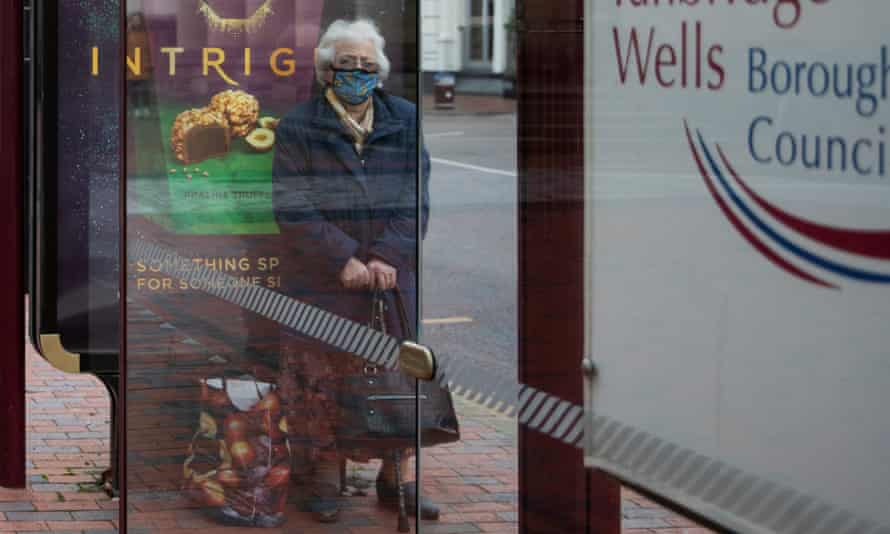Charities warn that shift on 19 July to personal choice on virus precautions is instilling fear in many most at risk

Cancer patients, disabled people and other clinically extremely vulnerable groups say they will feel unsafe stepping the house after hearing that mask and social distancing requirements are to be abandoned, charities have warned.
Campaigners estimate that 3.8 million people have been left feeling abandoned by the government’s shift towards promoting “personal responsibility” as the sole means of navigating the surging Covid-19 infection rates in England.
It means many people wary of coming into close contact with others who are infected will have to resort to self-imposed shielding.
The new government guidance for England advises those most at risk from the virus to continue to be cautious, meeting friends and family outside where possible and wearing face coverings on public transport.
Many vulnerable groups, such as those with underlying conditions or elderly people who shielded last year, were prioritised for vaccination. Roughly half of the UK is now fully vaccinated but Covid-19 cases are once again surging, driven by the highly transmissible Delta variant and the lifting of some restrictions.
Certain people with underlying conditions have weak immune systems that render the vaccines less effective, leaving these groups anxious about their fate.
“Macmillan Cancer Support is hearing huge anxiety about the removal of restrictions at the same time as cases are rising very fast,” said Steven McIntosh, Macmillan’s executive director of advocacy and communications. “Cancer patients feel they’re at risk of just going backwards, and feel unsafe stepping outside the house.”
It was “very frustrating”, McIntosh added, as the government had publicly confirmed its plans to discard almost all Covid social restrictions on 19 July but then released guidance for clinically vulnerable people only later in the evening, without consultation with the groups representing and supporting those individuals.
He said: “The government hasn’t learned the lessons of the past where big announcements for the whole of the country about … changes to restrictions weren’t accompanied by advice for those people who are most at risk and most anxious about those changes.”
Clinically extremely vulnerable people also include those with Down’s syndrome, cystic fibrosis and severe chronic obstructive pulmonary disease.
Louise Rubin, the head of policy and campaigns at the disability equality charity Scope, said: “Throughout the pandemic clinically extremely vulnerable people have felt forgotten and that their lives are seen as expendable. This guidance will make many clinically extremely vulnerable people feel they are on their own, having to rely on others taking responsibility, and without the support to keep themselves safe.”
Elizabeth Cleaver, a solicitor at the London-based law firm Bindmans LLP, said her firm had had a number of inquiries from concerned parents who had been shielding their clinically vulnerable children and were keen to have them vaccinated against Covid.
Although the Medicines and Healthcare products Regulatory Agency has given the green light for the use of the Pfizer/BioNTech vaccine for children over the age of 12, the Joint Committee on Vaccination and Immunisation (JCVI) has not yet issued a recommendation for vaccinating under-18s.
Cleaver said: “We haven’t issued proceedings because we are awaiting confirmation as to whether there is going to be some JCVI guidance published this week … we’re giving the government the last opportunity this week to actually issue that. Obviously the opening up [of society] on 19 July has really increased anxiety for these families because their clinically vulnerable children are even more vulnerable.”
Other organisations have raised the alarm about the confusion the new measures will bring to workplaces. Businesses say they do not have the full picture they need to properly plan for unlocking.
Claire Walker, a co-executive director of the British Chambers of Commerce, said: “Business leaders aren’t public health experts and cannot be expected to know how best to operate when confusing and sometimes contradictory advice is coming from official sources. This could lead to an inconsistent approach with different businesses reopening at different times and with different requirements, which could damage public confidence, give firms a huge logistical headache, and create a real risk of the economic recovery splintering.”
Kevin Rowan, of the TUC, said the effective, enforceable health and safety guidance now being removed made things very difficult for employers. He said: “It’s going to be a situation where individuals may or may not wear face masks. Some employers may require it, others won’t. But none of those issues are going to be legally enforceable. So if you’re in the Health and Safety Executive or in a local authority’s environmental health [section], there’s nothing for you to enforce.”
